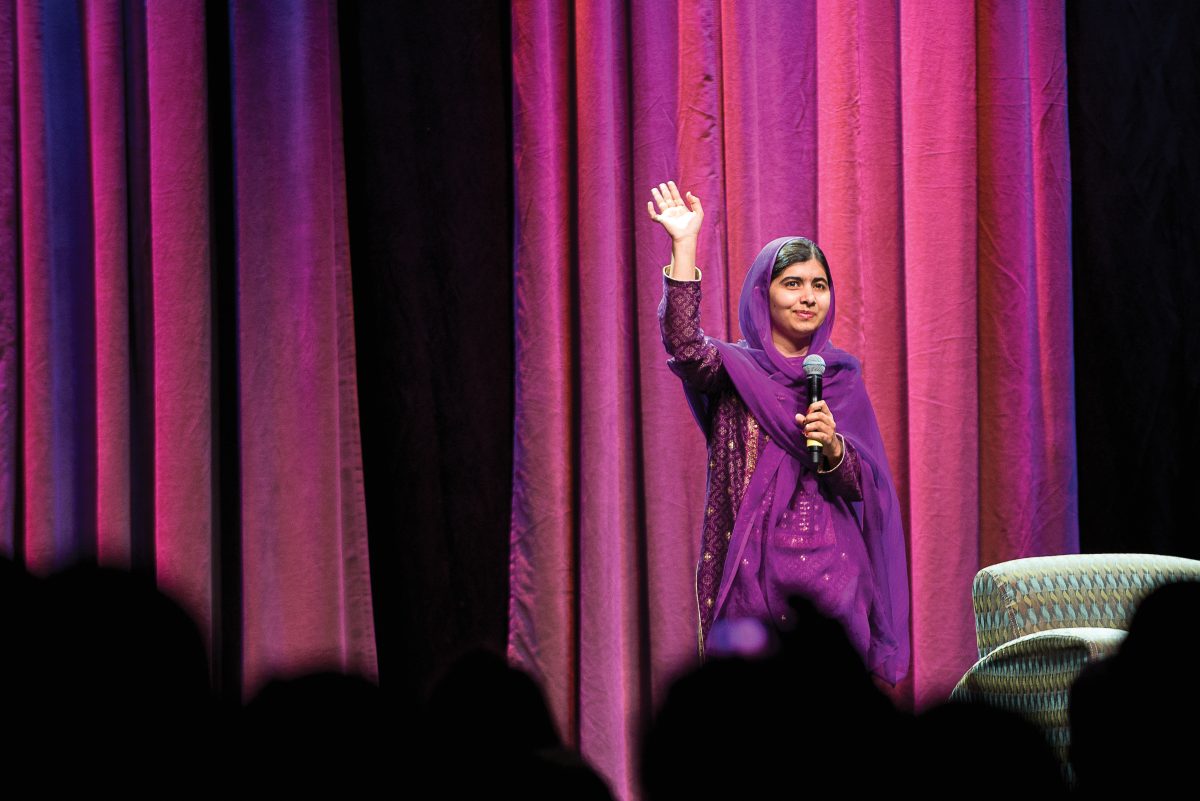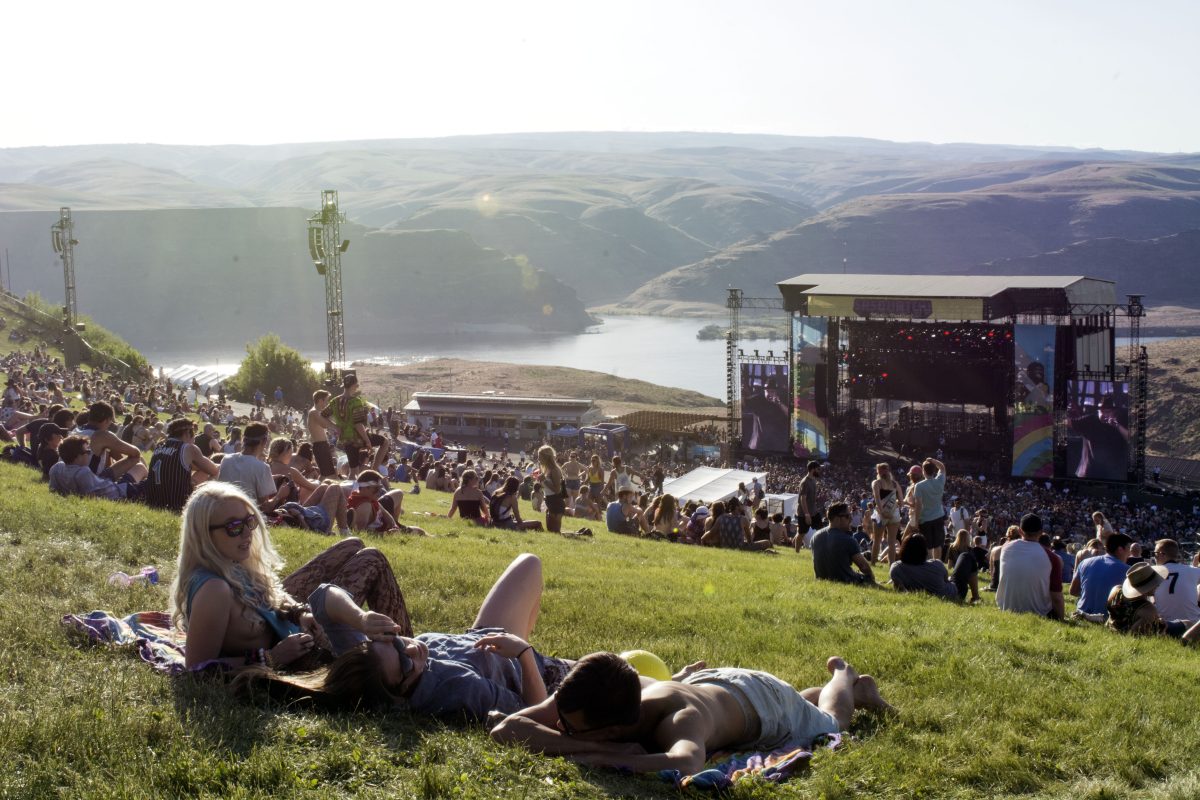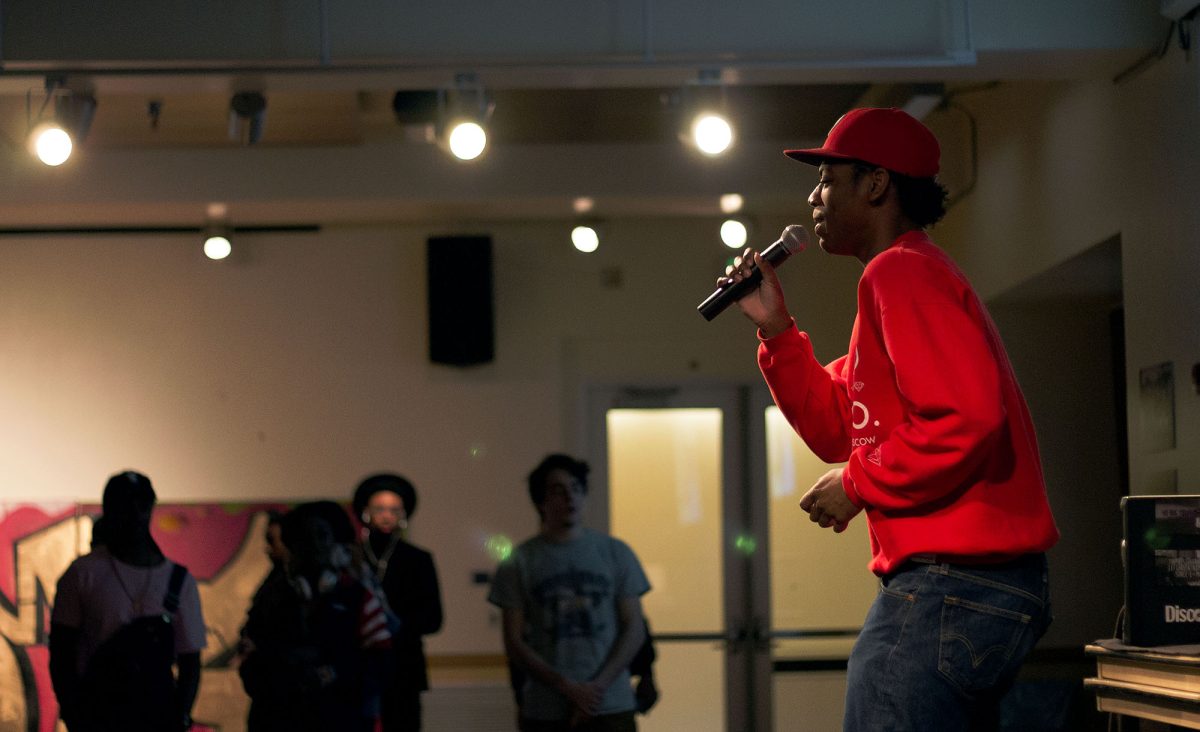Words by Aliya Hall/ Photos by Sierra Pedro
Nobel Peace Prize winner and author Malala Yousafzai was greeted to the stage of the Moda Center in Portland on August 30th, with a standing ovation and an eruption of applause. Yousafzai, now 19 years old, stood tall underneath the overhead lights, draped in vibrant purple. Her event, “An Evening With Malala,” brought people of all ages out to hear her personal story and mission for worldwide education. With the combined power of her eloquent speaking and enthusiasm for world change, by the end of the night, much of the audience had been moved to tears.
On October 9, 2012, Yousafzai was shot in the head by the Taliban coming home on the bus from her school in Pakistan for adamantly speaking out against their policy banning women from the pursuit of education. Of the three close-range shots fired at her, only one hit Malala. As the bullet from the Colt. 45 went through her left eye socket and exited beneath her shoulder, the other two shots hit her two friends beside her. The shooting put Yousafzai in critical condition, and doctors had to remove a section of her skull and replace it with titanium plating— which she says she now keeps in a glass jar in her bedroom as a momento. She was later transported to Birmingham, England for further treatment and has continued living there after her recovery.
Yousafzai has not let the shooting stop her from speaking out. In fact, she says she now has a “new life” and the terrorists had made a “big mistake” in targeting her.
“I realized the cause I was fighting for was so important that God was supporting me, and even death did not want me yet,” she says.
Yousafzai has continued to fight for women’s rights to education by setting up the “Malala Fund,” designed to amplify women’s voices, invest in local educational leaders and programs, and advocate for safety in schools and educational resources, according to Yousafzai’s website.
She has since wrote a book, I am Malala. and produced a documentary, “He Named Me Malala,” as well as received the 2014 Nobel Peace Prize.
After the initial introduction, the next section of “An Evening with Malala” was a Q&A with reporter Laurel Porter in a living room setting, which provided a certain sense of intimacy as Yousafzai opened up about her personal life before the attack by the Taliban.
Yousafzai talked about her childhood in Swat Valley, Pakistan, which she described as the “most beautiful place in the world.” She began her education at her father’s school, something that she said was very important to him because her aunts didn’t have the opportunity to be educated. Her father was met with a thunderous applause as he rose from his seat in the front row after being pointed out as supporting Malala on her tour around the nation.
Yousafzai says that her parents are her two biggest inspirations; she explained that when she was in surgery, her mother prayed non-stop and kept thinking about “the mothers of the men who shot her daughter.” When they talk about the Taliban, Yousafzai says her mother quotes a line from the Quran: “Truth has to come, falsehood has to die.”
Yousafzai didn’t shy away from mentioning her religion. When the questions shifted to how she felt about the rampant Islamophobia in the world she explained how “completely unfair” it was to blame the entire Muslim population for all the accounts of terrorism.
“We have to fight against terrorism by standing up with Muslims, then it will bring change and peace,” she says. “Islam means peace. You can interpret the religion any way you like. To me it’s a religion of peace, tolerance, and love for one another.”
Even during her introduction, Yousafzai addressed Presidential candidate Donald Trump’s attitude regarding Muslims with the quip: “If you want me to come back here as a Muslim, you have to make the right decision.”
Her humor came across as well when she recounted to the audience how she received the news of winning the Nobel Peace Prize while in her chemistry class. She was called out of the classroom by her principal and assumed that she was in trouble. When she found out instead that she won, she said her first feeling was relief that she wasn’t being punished. After the announcement at her school’s assembly, she celebrated by going back to her classes and finishing her school day, joking that she had to set an example of doing what she had just won for.
Beyond the laughter and cheering, the audience appeared enthralled by the humbleness Yousafzai carried herself with by never mentioning her Nobel Peace Prize on her applications for college and by her fierce determination to achieve her goals. She says her biggest dream is to have all girls go to school, but at the moment, she’s focusing her attention on educating the “lost generation” of Syrian refugee children because she believes that “education is the only way we can save this generation.” To underscore the importance of the issue to her, Yousafzai explained that for her birthday she visited Syrian children in some refugee camps, where the women and girls shared their stories, many of which she described as “heart-wrenching and touching.”
“If you want the future to be bright, you must educate the future of Syria,” she says.
Yousafzai says that everyone she meets inspires her to do more, and in turn, she encouraged the audience to do more as well.
“Believe in your voice, work, and participate in this world,” she says. “Your voice, when the world doesn’t speak, is so important. Always believe in your voice. Everything you do brings a change, whatever you do.”
As Yousafzai rose to say goodbye to the audience, the crowd was already on their feet. She had to wait for the applause to die down before she could say her parting words:
“Believe in love. Make your heart beautiful.”
Categories:
Malala Yousafzai: Make Your Heart Beautiful
October 2, 2016
0
Donate to Ethos
Your donation will support the student journalists of University of Oregon - Ethos. Your contribution will allow us to purchase equipment and cover our annual website hosting costs.
More to Discover














